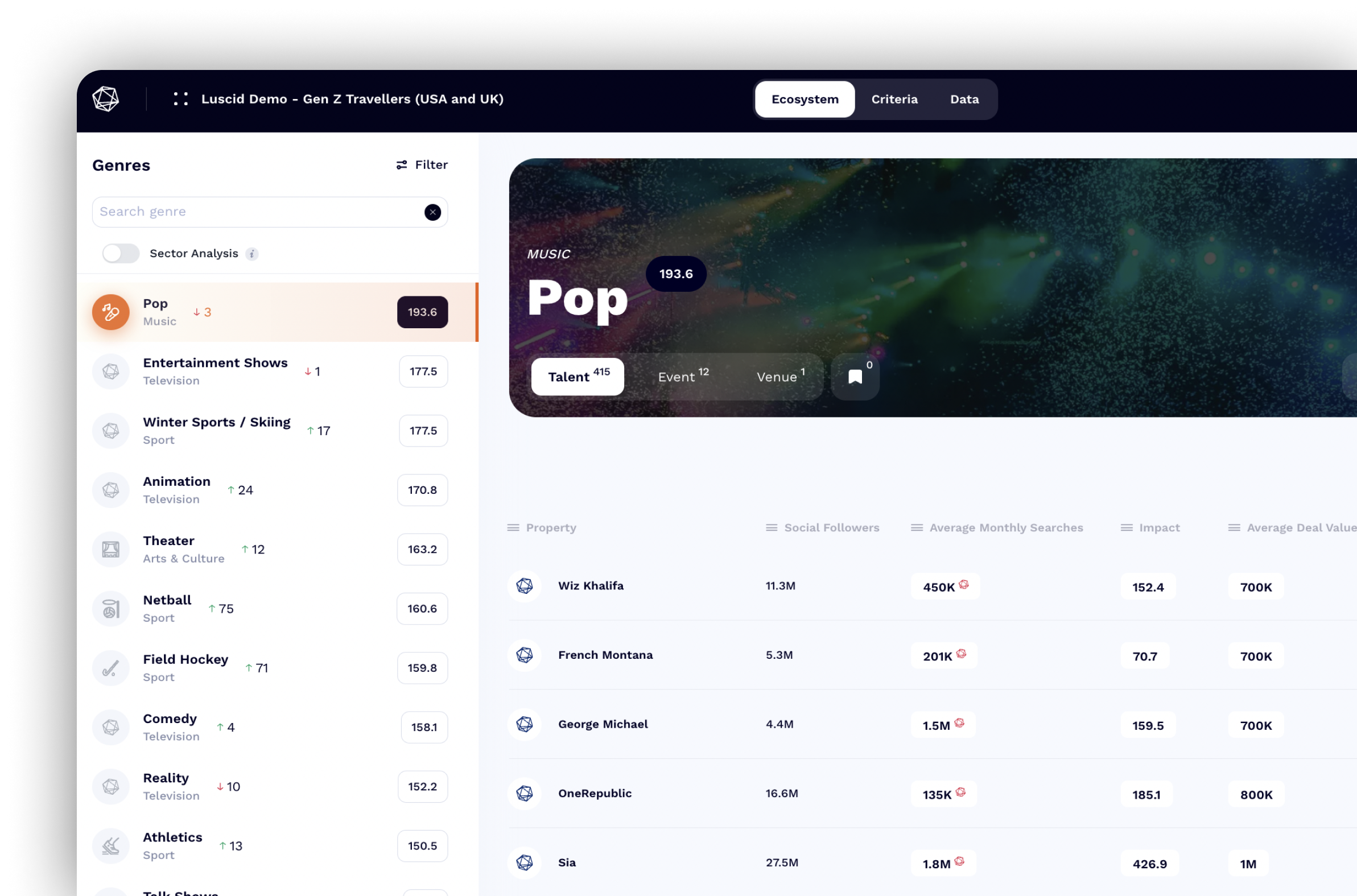The sponsorship landscape is undergoing its most significant transformation to date. The sports sponsorship market is projected to reach $161.12 billion by 2032, growing at 8.7% annually, as the industry continues to evolve beyond traditional logo placement and toward a more sophisticated, data-driven ecosystem. This evolution signals a fundamental change in how brands approach and value partnership opportunities.
As we look toward 2025, three key factors are reshaping sports sponsorship: marketing technology, evolving fan expectations and changing societal values. This blog explores how these trends transform how brands create meaningful partnerships.
Key Sports Sponsorship Trends Reshaping 2025
Data-Driven Sponsorship Decisions
Among the most significant sports sponsorship trends for 2025 is the growing use of data. While brands have been moving beyond gut instincts in recent years, there remains a substantial opportunity to leverage data in sponsorship decision-making. With predictive analytics set to reach $46597 million by 2030, data-driven insights are becoming fundamental to how brands approach partnerships. This shift represents a new stance in sponsorship strategy, where informed decisions lead to stronger partnerships.
Strategic Partnership Selection
Data is transforming how brands identify and evaluate partnership opportunities. By analysing thousands of data points across markets, industries and audience behaviours, brands can now identify partnerships that truly align with their objectives. This analytical approach is revolutionising how organisations select and activate sponsorship that resonate with their target audiences and align with their brand values.
AI-Powered Innovation
By 2025, 80% of companies will adopt intelligent automation in their operations, including sponsorship strategy. This advancement enables brands to understand audience preferences more deeply, bring time efficiency to their decision-making, and ultimately create opportunities for more meaningful partnerships that connect with the right audiences at the right moment.
This transformation in sponsorship decision-making represents a fundamental shift in how brands approach partnerships and the trust being placed in data and technology to influence their direction of travel. Success in this new era requires combining data-driven insights with strategic thinking to create partnerships that deliver authentic value.
The Digital-First Evolution in Sports and Entertainment
Another crucial trend in sports sponsorship in 2025 is the use of digital technology. The digital transformation of sponsorship is creating unprecedented opportunities for brands. VR technology, which is growing at 17.4% annually through 2030, and platforms like TikTok, which has exploded past 1 billion active users globally, are becoming increasingly popular for audiences to capture brand content, and sponsorship is no different.
Virtual Reality
With 45% of VR users being Gen Z, innovative brands are seizing the opportunity to pioneer new forms of engagement. An example is the recent Snickers’ Super Bowl LVIII partnership with Blippar, which showcased how emerging technologies, like VR, can transform traditional sponsorship moments into measurable, interactive experiences.
Social Platforms: Driving Engagement
Social platforms are becoming increasingly popular for audiences to consume live-stream TV. Twitch generates 1.3 trillion minutes of annual watch time. These platforms offer sophisticated integration opportunities that align with modern audience behaviours while providing robust measurement capabilities. For sponsorship strategy, this means unprecedented opportunities to create authentic, real-time connections with engaged audiences.
Purpose-Led Partnerships: Values in Action
Brands are becoming increasingly purpose-driven in their selections. When selecting partnerships, brands using the Luscid platform are increasingly prioritising alignment with core CSR and ESG-focused values, from diversity and equality to environmental responsibility, from female leadership to ethnic diversity. These value-driven decisions are proving to be crucial differentiators in the sponsorship landscape, helping brands create deeper, more authentic connections with their audiences.
Environmental Leadership
The 2024 Paris Olympics’ commitment to bring the first “climate-positive” Games aimed to target a 50% carbon reduction, demonstrating how sustainability is reshaping major sponsorship properties. This evolution reflects a broader shift in how brands approach partnership opportunities going forward, with environmental impact becoming a key consideration in sponsorship strategy.
Gender Equality Momentum
Women’s sports offer some of the most dynamic opportunities in sponsorship, with elite sports revenues projected to reach $1.3 billion in 2024. With 85% of industry leaders predicting double-digit growth over the next three to five years, this area of the sport and sponsorship arena is an interesting and compelling platform to focus on.
Community Impact
From UEFA’s “Football in Schools” program to localised engagement initiatives, community development has become fundamental to sponsorship strategy. These programs demonstrate how brands can create lasting impact while building meaningful connections with audiences. Sport is a powerful vehicle that can inspire and unite across multiple audience demographics.
This new trend in sponsorship reflects a fundamental change by creating authentic connections that resonate with increasingly conscious audiences.
Regional and Global Sponsorship Balance: Think Global Act Local
The evolution of sponsorship strategy demands a sophisticated balance: delivering consistent global messaging while creating authentically local experiences.
Regional sponsorship often delivers exceptional value, enabling brands to build deeper community connections at optimal costs. These focused partnerships create authentic local relationships while contributing to broader brand objectives.
This “glocal” approach represents the future of sponsorship strategy. Success lies in maintaining global brand consistency while creating meaningful local connections – a balance that’s becoming essential for maximising sponsorship value across diverse markets.
Looking ahead: The Future of Sponsorship
As we look toward 2025 sports sponsorship trends and beyond, successful sponsorship strategies will require a delicate balance of technology, data and human insight. The most effective partnerships will:
- Leverage data analytics to support the sponsorship selection process
- Embrace digital innovation while respecting traditional fan experiences
- Address global audiences while remaining locally relevant
- Support meaningful causes while delivering measurable business results
The evolution of sports and entertainment sponsorship presents both challenges and opportunities. As brands continue to use data-driven decision-making, maintain authenticity in their partnerships, and remain adaptable to changing audience expectations, they will be best positioned to succeed in this dynamic landscape.
Success in 2025 and beyond means that the sponsorship environment won’t just be about reaching audiences – it will be about creating meaningful connections that resonate across platforms, borders, and generations.
Explore more sponsorship insights from Luscid, here.


